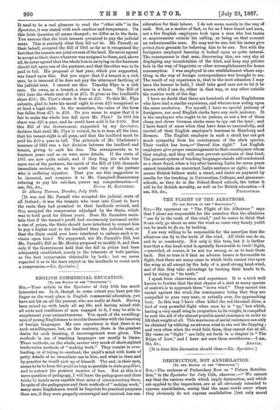ENGLISH COMMERCIAL EDUCATION.
[To Till EDITOR 07 'rill SeseTLTon."]
Sra,—Your article in the Spectator of July 16th has much interested me. In it, though to some extent you have put the finger on the weak place in English commercial education, you have not hit on all the persons who are really at fault. Having been mixed up with trade all my life, and having mixed with all sorts and conditions of men engaged in it, I may be able to supplement your animadversions. You speak of the unwilling. ness of young Englishmen to trouble themselves with the learning of foreign languages. My own experience is that there is no such unwillingness, but, on the contrary, there is the greatest desire for such learning, if encouragement were given. The methods in use of teaching languages are mostly to blame. These methods, on the whole, savour very much of short-sighted trade-union methods of " making work." They consist in over- loading, or of trying to overload, the pupil's mind with hosts of petty details of no immediate use to him, and what in time and by practice be would pick up of himself. The end, in their eyes, seems to be to keep the pupil as long as possible in stain pupillari, and to extract the greatest number of fees. But as this is a mere question of pedagogy, I will leave the pedagogues and their tricks to bands more capable than mine of circumventing them. In spite of the pedagogues and their methods of " making work," many more Englishmen would be linguists for practical purposes than are, if they were properly encouraged and received due con-
sideration for their labour. I do not mean merely in the way of cash. But, as a matter of fact, so far as I have heard and seen, not a few English employers look upon a man who has tastes or acquirements outside his calling, as being on that account an unbusinesslike man. He may not be one, but his tastes give prewictiacie grounds for believing him to be one. But with the foreigners employed learning is looked upon as quite natural. The consequence is that men, discovering this, are very shy at displaying any eccentricities of the kind, and keep any private fads in the way of linguiatio or other accomplishments for home consumption. I was employed in one establishment where any- thing in the way of foreign correspondence was brought to me. The result of my experience is, that in the next situation I may have the honour to bold, I shall take good cam not to let it be known what I can do, either in that way, or any other outside the routine work of the day.
I have no doubt that there are hundreds of other Englishmen who have had a similar experience, and who are now acting upon the same resolution. For myself, I have no special jealousy of foreigners, nor need English clerks have any each jealousy. It is the employers who ought to be jealous, as not a few of these cheap and clever German clerks come to spy out the land ; and I have heard of cases when they have done so successfully, and carried off their English employer's business to Hamburg and Bremen. The English employer in such a strait has not got much sympathy from his countrymen of the clerk species. Their verdict has been,—" Served him right." Let English. employers give proper encouragement to their countrymen whom they employ, and they will soon prevent accidents of that kind. The present system of teaching languages stands self-condemned as a sheer fraud, when a boy after learning Latin for seven years cannot translate an uncorrapt Latin sentence at sight; and the sooner British fathers make a stand, and insist on payment by results far the teaching in Universities, Colleges, and grammar- schools, as they do in the School-Board schools, the better it will be for British morality, as well as for British education.—I


































 Previous page
Previous page